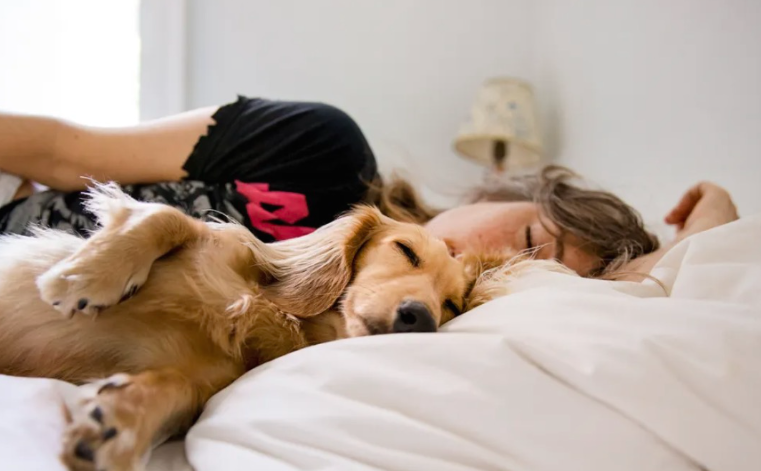
Undoubtedly, the importance of a good night’s sleep for overall health is widely acknowledged. With numerous studies exploring the optimal ways to achieve quality rest, recent research proposes a surprising solution, sharing the bed with dogs. Canisius College in New York State spearheaded this unconventional investigation, revealing that women experience better sleep next to their canine companions compared to human or feline counterparts.
Lead researcher Christy Hoffman, Ph.D., an animal behaviorist, conducted a survey involving nearly a thousand women across the United States to draw these intriguing conclusions. The results unveiled that 55% of participants shared their beds with at least one dog, 31% with a cat, and 57% with a human partner.

Hoffman delved into the reasons behind dogs emerging as superior sleep partners. The study highlighted that dogs’ sleep patterns align more closely with humans than those of cats. Hoffman theorizes that this synchronization may contribute to improved sleep quality, as dogs are adept at accommodating their owners’ sleep schedules, potentially mitigating disruptions caused by differing bedtime routines.
Furthermore, the structured routines imposed by dogs, such as morning walks, assist in regulating their owners’ daily schedules, thereby enhancing overall sleep quality. Another contributing factor is the physical stillness of dogs during sleep, unlike fidgety feline companions. Women in the study reported that dogs tended to remain on the bed throughout the night, fostering a sense of security and stability.
The study’s third crucial finding emphasizes the unique sense of security that dogs provide. Unlike cats or even human partners, dogs offer a heightened level of psychological comfort. Hoffman suggests that the perception of dogs as vigilant protectors, capable of alerting their owners to potential intruders, plays a role in enhancing the sense of security.

Despite these intriguing findings, the study acknowledges the subjectivity of sleep preferences. Factors such as a dog’s snoring or generating excess warmth could pose challenges. Additionally, there are individuals who find solace in the companionship of cats during bedtime.
It’s essential to note that the study relies on participants’ subjective perceptions of their pets’ impact on sleep quality and duration. Consequently, further research is necessary to definitively crown dogs as superior sleeping partners. Hoffman emphasizes the need for continued exploration into the various contexts under which pets positively or negatively influence sleep quality.
As American households increasingly welcome pets, understanding these dynamics becomes crucial. Future research may utilize technologies like Fitbit-like devices to objectively track sleep quality in diverse sleeping conditions, providing a more comprehensive understanding of the intricate relationship between humans and their animal companions during bedtime.
18 Child Actors Who Are All Grown Up Now, and We Didn’t Even Notice It (New Pics)
It seems that some of the films and TV series we loved as children are now decades old. Think of The NeverEnding Story, The Chronicles of Narnia: The Lion, the Witch and the Wardrobe, or even Baywatch. And of course, the young actors that played child roles in these have grown up significantly. For example, Jonathan Lipnicki, the child star of Jerry Maguire, is already 30 years old, and Noah Hathaway, who is remembered for his performance as Atreyu in The NeverEnding Story, will turn 50 in November 2021. Even Georgie Henley, aka Lucy in The Chronicles of Narnia is now 25!
Bright Side did some research to find out what 18 child actors from the ’90s and the beginning of the ’00s look like today, and here’s what we found.
1. Jeremy Dunn Jackson (Hobie Buchannon), Baywatch (1991-1999)

2. Jonathan Lipnicki (Ray Boyd), Jerry Maguire (1996)

3. Daryl Sabara (Juni Cortez), Spy Kids (2001)

4. Taylor Lautner (Sharkboy), The Adventures of Sharkboy and Lavagirl 3-D (2005)

5. Georgie Henley (Lucy Pevensie), The Chronicles of Narnia: The Lion, the Witch and the Wardrobe (2005)

6. Matthew Lawrence (Chris Hillard), Mrs. Doubtfire (1993)

7. Lisa Jakub (Lydia Hillard), Mrs. Doubtfire (1993)

8. Noah Hathaway (Atreyu), The NeverEnding Story (1984)

9. Nicholle Tom (Ryce), Beethoven (1992)

10. Giorgio Cantarini (Giosué), Life Is Beautiful (1997)

11. Anna Chlumsky (Vada Sultenfuss), My Girl (1991)

12. Patrick Renna (Hamilton “Ham” Porter), The Sandlot (1993)

13. Ivyann Schwan (Trixie Young), Problem Child 2 (1991)

14. Madison Lintz (Sophia Peletier), The Walking Dead (2010-2012)

15. Mackenzie Foy (Renesmee), The Twilight Saga: Breaking Dawn — Part 1 and Part 2 (2011-2012)

16. Alexa PenaVega (Carmen Cortez), Spy Kids (2001)

17. Edward Furlong (John Connor), Terminator 2: Judgement Day (1991)

18. Raven-Symoné (Olivia Kendall), The Cosby Show (1989-1992)

Which of the series or movies listed above is your favorite? Which of the actors do you think has changed the most? Is there anybody else you think we should add to this list?
Preview photo credit The NeverEnding Story / Warner Bros. and co-producers, noahhathaway*** / Instagram



Leave a Reply